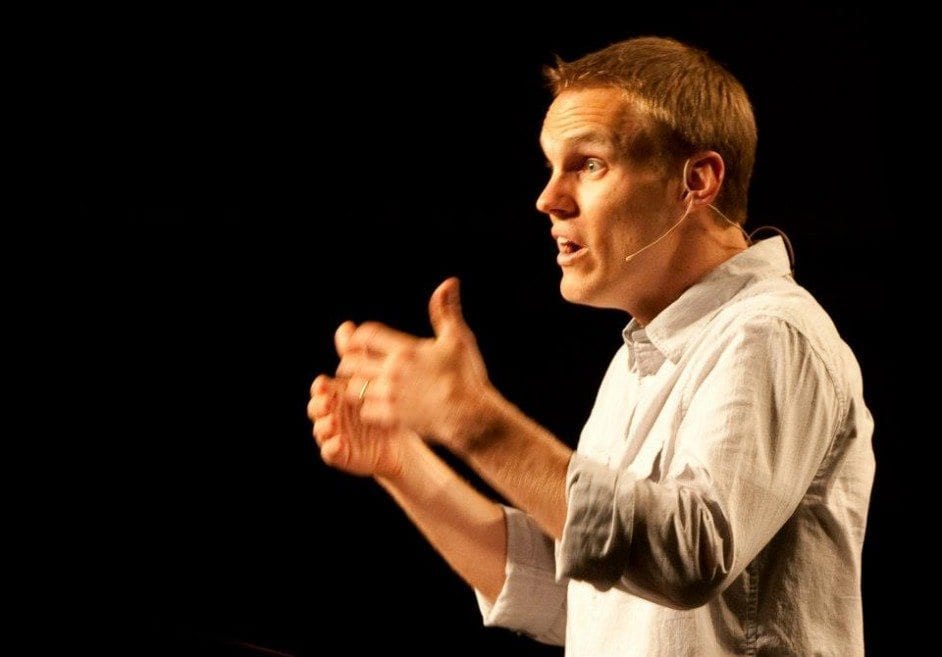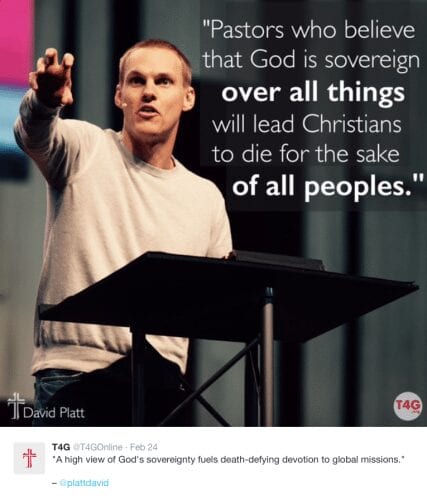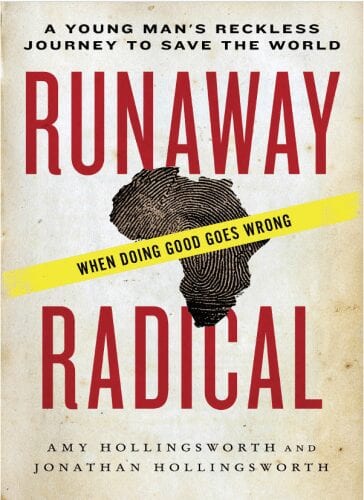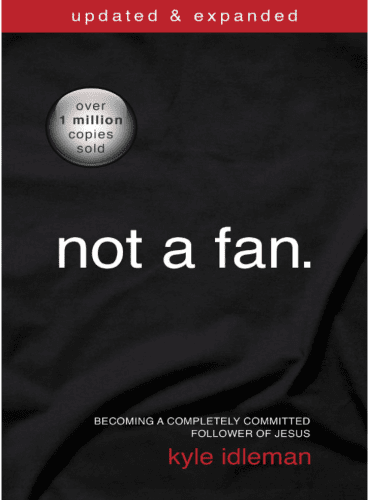
“Make it your goal to live a quiet life, minding your own business and working with your hands, just as we instructed you before.Then people who are not Christians will respect the way you live, and you will not need to depend on others.”
1 Thessalonians 4:11-12“This is what the Sovereign Lord, the Holy One of Israel, says:
“Only in returning to me and resting in me will you be saved. In quietness and confidence is your strength.
But you would have none of it.”
Isaiah 30:15
“…there is no injustice in God. The injustice lies in Christians who possess the gospel and refuse to give their lives to making it known among those who haven’t heard..”
–David Platt, “Radical”“This is the unavoidable conclusion to Matthew 10. To everyone wanting a safe, untroubled, comfortable life free from danger, stay away from Jesus. The danger in our lives will always increase in proportion to the depth of our relationship with Christ.”
-David Platt, “Radical”
![]()
I recently had a short dialogue on a website centering on the subject of David Platt. The dialogue was initiated by an individual stating that Platt’s sermon at the upcoming Together 4 the Gospel will be “Martyrdom and Mission: Why Reformers Died In Their Day, How We Must Live In Ours.” You can bet Platt’s sermon will have a “radical” edginess to it. I wrote about Platt and the “Radical” buzzword back in December 2013. You can find the article here. I also wrote about Platt in August of 2013. The article was titled “Truth in Advertising?” and can be viewed here. I documented the fact that Platt, in an attempt to look radical and sell books, was less than truthful. Platt is a bit too intense for my liking; he seems to always be on message and that message is: Christians must be radical; lose-your-life radical; give-up-all and go to a dangerous foreign country radical. But hey, it sells books and fills conferences, and at the end of the day, the bottom line for American Evangelicalism seems to be all about the bottom line.
Platt’s target audience for all things radical appears to be high school and college age youth. These young adults are energetic, idealistic, and desirous of doing great things for Jesus. Lately, it appears Platt is expanding his message to an older group of man-boys, specifically the T4G conference attendees. The T4G conference is like a high school pep-rally on steroids. Billed as a “biennial conference for pastors,” it has morphed into a conference with an all-star line-up of Neo-Calvinist Christian celebrities. Book sales are brisk and if you are fortunate you may be able to snag an autograph or two of the celebrity pastor you most idolize.

“Radical” David Platt is on message!
John Piper, a celebrity seemingly one step below Abraham, will also be in attendance at T4G, sharing his wisdom and discernment with his adoring fan-boys. Speaking of discernment, you may recall Piper is a vocal supporter of CJ Mahaney (he of blackmail and conspiracy to cover-up sexual abuse fame) and also supported Mark Driscoll (he of plagiarism and possible RICO fame). Anyway, Piper, whose track record on picking winners that are, shall we say, less than stellar, seems to think that Platt’s “Radical” has all the makings of a winner, so now he is hitching his wagon to that horse. The only problem is, the whole “Radical” plea foisted upon younger Christians seems to be causing them a lot of problems. To anyone paying attention this is no surprise; neither is the fact that Piper has picked another loser.

Pastor “Emeritus” John Piper marketing the flavor of the day.
![]()
This brings me to the subject of this post. In my dialogue, mentioned above, a lady was kind enough to point me to an article about Jonathan Hollingsworth. Hollingsworth is an admirable young man who has a soft heart for the down and out of society. He lived out his faith in Christ by caring for “the least of these.” He gave away his clothes, fed the hungry, gave money to the poor, and befriended the friendless.
Hollingsworth was, in my opinion, demonstrating the love of Christ in concrete ways to those among us who are needy. But Hollingsworth always felt he wasn’t doing enough. Fueled by Christian authors such as David Platt, Hollingsworth felt his life could always be more radical for Jesus, and to that end, he decided to go to Africa for one year.
What followed could only be described as a disaster, both in Africa and even worse, by his pastor when he returned home. Hollingsworth and his mom wrote an outstanding book about the ordeal and I highly recommend it.

Here is a brief video dealing with Hollingsworth’s story and the larger problem this “Radical” mindset is causing our youth:
Platt is not the only author to “make bank” by appealing to young, eager, idealistic Christians to live a radical, sold out life for the Savior. Unfortunately, when Christians sniff a buck is to be had, there is no shortage of individuals who will attempt to capitalize on the opportunity. Below I illustrate Platt’s book and a similar book titled “Not a Fan” by Kyle Idleman, two of the most successful sellers on this subject. I am certain that if you search you could find several other similar books.


These next three videos are, in my opinion, tailored to young people. I find them quite disturbing.
https://vimeo.com/118178303
https://vimeo.com/47145776
“And here’s the question that is keeping me awake these days: Am I really carrying a cross if there is no suffering and sacrifice? When is the last time that following Jesus cost you something? When is the last time it cost you a relationship? When is the last time following Jesus cost you a promotion? When is the last time it cost you a vacation? When is the last time you were mocked for your faith? Forget about having our lives threatened…When is the last time you went without a meal for the sake of the gospel? Can you really say you are carrying your cross if it hasn’t cost you anything? Take a second and answer that question in your mind. Has it cost you anything? If there is no sacrifice involved, if your’re not at least a little uncomfortable, then there is a good chance that you aren’t carrying a cross.”
Kyle Idleman, “Not a Fan.”
![]()
Jonathan Hollingsworth’s story is full of sad stories, stories of men more concerned with money and reputations than people. Saddest of all was Hollingsworth’s pastor. He did his best to shut Hollingsworth and his parents up. Unfortunately, we see this type of behavior over and over among pastors dealing with sexual abuse in their church. The Wartburg Watch has just published one such story recently.
Here is the relevant quote from “Runaway Radical.”
“The secrecy needed for shame to work isn’t tied to a lack of witnesses only. You have to ensure the person being shamed never tells what was said or done in secret. The best way to do that is to make it personal. Start by calling into question his manhood, frame his return as an act of weakness. Then tell him his parents appear crazy, that their intervention in his rescue only escalated things. Tell him that “sin varies from culture to culture,” so that the kind of abuse that’s considered sinful in America may not be sinful in Africa. Tell him that unless there are bruises or evidence of adultery, you should stay where you are and keep your oath. If you don’t feel you’re making progress, you can come up out of your chair and physically intimidate the person you hope to shame, especially if your amplitude overshadows his frail frame. Then once the person’s shoulders sag in compliance (that’s the cue), you use your leverage to control what happens next. Because controlling what happens next is key. The shame you’ve cultivated can’t change anything; it can’t reverse a decision. No one’s getting back on a plane to Africa. But you can channel it into working on your behalf, and you can tell the young man that there is a prescribed list of people who can be told the truth— excluding the truth of this meeting, of course— about what happened to you. And that list includes your father and your mother and your sister. No one else may know. You are to tell non-list people that you had “philosophical differences” with your mission agency. And then when the young man does, in fact, tell someone what you said, when he surprises you and tells his parents you think he’s not a man and they are crazy, you invite his parents in for a meeting and, of course, you don’t repeat anything you said to their son. But you go straight to the catch: no one may know what really happened. And if they and their son don’t agree to silence, then neither do you— and you are free to say whatever you want about him from the pulpit. But that’s not a threat. No, it’s not a threat. And perhaps the young missionary’s parents, because he has already been so traumatized, encourage him to agree to the silence because they want it to be over and they don’t want him hurt any more. And so you’ve won— and you didn’t even need to come out of the chair this time— because of the fear and the pain and the shame. You sit back and you mark the young man off your to-do list, confident that he will never tell.”
Hollingsworth, Amy; Hollingsworth, Jonathan Edward (2015-03-03). Runaway Radical: A Young Man’s Reckless Journey to Save the World (pp. 134-136). Thomas Nelson. Kindle Edition.
![]()
In my opinion, we Christians would be better off to be a whole lot less radical. Life is a marathon, not a sprint. Take a deep breath or two and break free from the frenetic lifestyle trumpeted by the likes of Platt and Idleman. Take time to enjoy life and love those around you. Matt B. Redmond is a favorite author of mine. He authors a great blog and his book “The God of the Mundane” is a refreshing salve to “Radical.” The man is sensible and normal. Below is a quote from his book. I am all for what Redmond advocates, may his tribe prosper!

“For as long as I can remember I had been reading the letters to the churches in the New Testament and missing something. I missed it as a young man wanting to enter vocational ministry, and I missed it as a seminary student. I sadly missed it as a pastor. Sometimes we may miss things because they are hidden. But we seem to always miss much because we see it every day.
I missed the obvious: the Apostles are writing to normal people. Most of them are nameless. They are Jew and Gentile, yes. But they are also not apostles. And most are not pastors. They are carpenters, farmers, traders, sailors, fisherman, shepherds, guards. They are mothers and fathers and children. Compared to the life of an apostle, their lives are probably mundane. These are ordinary men and women believing an extraordinary story. They are not the Apostle Paul, or Peter, or any of the other apostles, who are immortalized in the pages of sacred writ. They are ordinary people who huddled in someone’s home, drank their wine, ate their bread, and listened to the Holy Spirit through the words of an Apostle. And then they went home. And they got up the next morning and lived a normal life, probably to the end of their days. And now, poof! They are forgotten.
My guess? Most of them lived out the rest of their lives after coming to faith with the most exciting thing in their lives being when they believed and aligned themselves with Christ and his people. They kept on living where they were and making a living as they did before they believed. They lived normal lives. Only more so. They listened to Paul’s teaching, learned from him, and in faith stayed where they were after he left. All of this should have been obvious to me but it wasn’t. For years I read and thought and then taught as if Paul was the standard for those I was teaching. “Look at Paul and his singular devotion to Christ,” I would implore them. And then it hit me. The nameless, ordinary believer who listened to Paul and lived faithfully as a farmer, mother, etc., right where they were — they are the standard. The forgotten mundane existence of those whose names we will never know is the endgame.
It is true Paul says to his readers, “imitate me…” And he says it more than once. In each instance, Paul wants his readers to see that he is an example of what he is asking of them in that particular context. His life is consistent with what he is teaching. He isn’t out of step. But he never asks them to stop being who they are. He never challenges them to go anywhere. We don’t even get hints that lead us to believe he is making them feel guilty for living in comparative comfort compared to his lack of it. That’s weird. And it’s weird because this is so common in our pulpits and in conferences held for zealous college students.
So many pastors today, famous ones and otherwise, are asking young people and everyone else if they are willing to give it all and go overseas as a missionary. It’s not a bad question to ask. There is no question in my mind that this question needs to be out there. But they — or someone — also needs to ask, “are you willing to be numbered among the nameless believers in history who lived in obscurity? Do you have the courage to be forgotten by everyone but God and the heavenly host? Are you willing to be found only by God as faithful right where you are? Are you willing to have no one write a book about you and what you did in the name of Christ? Are you willing to live and believe — in stark contrast to the world around you — there is a God of the mundane?”
-Matt B. Redmond